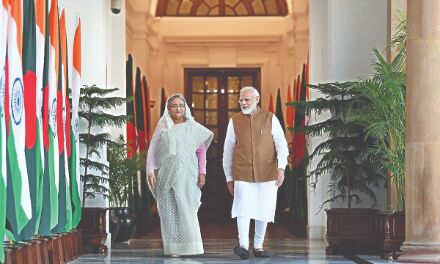Full of prospects
Indian PM’s engagement in Bangladesh’s historic celebration was a well-taken opportunity to strengthen India’s ties with the nation across varied sectors

By the time this piece reaches the readers, Prime Minister Narendra Modi must be back in New Delhi after his two-day (March 26-27) visit to Dhaka where he participated in the twin celebrations of Bangladesh's golden jubilee of independence and Sheikh Mujibur Rahman's birth centenary. The visit is considered very significant as this was the first overseas visit of the Indian Prime Minister after the onset of the pandemic, and with this, relations with Bangladesh will be further strengthened. The visit is a clear signal to the South Asian neighbourhood that Indo-Bangladesh ties are now on a very sound footing despite irritants surfacing intermittently.
During his Dhaka stay, PM Modi was to pay a visit to Tungipara where Sheikh Mujib remains buried, to offer prayers. Other than this, he also planned to visit two Hindu temples in the districts of Satkhira and Gopalganj. This would be great and timely succour to the Hindu minorities in Bangladesh, especially to the people of Shalla in district Sunamgunj which very recently saw blatant acts of vandalism and desecration of temples by a radical Islamic outfit, Hefazat-e-Islam which was thought to be enjoying the patronage of the ruling Awami League (AL). Incidentally this controversial organisation also vehemently opposed installing statues of Sheikh Mujibur Rahman calling it non-Islamic and even threatening to uproot them.
During the ten-day celebrations of Mujib centenary and 50th year of Bangladeshi independence, heads of governments from neighbouring countries like Bhutan, Sri Lanka, Maldives etc. were present, but the events were conspicuous by the absence of Pakistan Prime Minister Imran Khan who, during his tenure, had initiated many overtures to woo Bangladesh, possibly and largely at the behest of China. Imran Khan had even sent a full-fledged High Commissioner to Dhaka in January last year to defreeze the bilateral ties between Bangladesh and Pakistan that had plummeted due to stepped-up anti-Bangladesh espionage activities undertaken by the undercover Pakistani intelligence operatives.
With this thaw coming, it was expected that Imran Khan would grace the occasion showing his magnanimity after Pakistan had committed so many atrocities on the Bengalis during the run-up to the liberation. This would also have allowed him to apologise to the people of Bangladesh for the genocide committed 50 years ago. It's almost certain that even if he had plans to do so, his armed forces and the people wouldn't accord sanction to it. That's what appears from the media reports appearing in the Pakistan press. Also, the Lahore Management Institute and a few other organisations had planned to observe the birth of Bangladesh half a century ago but they put off such plans at the last minute. It's, therefore, clear that Pakistan and Pakistanis have not yet reconciled to the hard reality that Bangladesh came into being in 1971, rejecting the 'two nation theory' and dismembering Pakistan for its excesses. Imran Khan's stature would have gone up by several notches if he had shown some statesmanship through his presence.
Secondly, he would have had a great chance of meeting Prime Minister Modi on the sidelines of the Dhaka visit. This was perhaps more imperative in the light of the emerging thaw between India and Pakistan, especially after the March 23 greetings by PM Modi to Imran Khan on the occasion of Pakistan Day. The Indian PM was gracious enough in wishing Pakistan for cordial bilateral relations. In sum, a great opportunity was lost. As they say, opportunity doesn't knock twice on your door. And Imran lost it quite visibly.
It was really a matter of political wisdom and mature thinking on part of India to have represented in the twin rejoicings in Dhaka that too at the prime ministerial level. So many exchanges took place and pacts were signed, further reinforcing bilateral ties. Hasina has taken Bangladesh forward to newer heights under her dynamic stewardship. Her conduct and behaviour, of late, both domestically and internationally, are of the nature of a stateswoman. Her standing in the global platform has gone up. She is seen as an able ruler ensuring that Bangladesh's track record on the fronts of economy, security, trade etc remains on top. The country will cease to be a Least Developed Country (LDC) in 2026. Further, Bangladesh has recently got a respectable ranking among the happiest countries in a world survey. The US, UK, China and other powerful countries are trying to come close to Hasina and her country as it progresses from strength to strength. The last 50 years have been by and large glorious. Once dubbed as a 'basket case', its economic engine has now surged forward phenomenally. Bangladesh's garment exports, even though it's not a cotton-growing country, have overtaken Pakistan by miles. Similar feats have been achieved in GDP and FOREX reserves. For India, Hasina has been a rock-solid support, principally in getting rid of all the northeast insurgents earlier harboured on the soil of Bangladesh. Other than the redressal of these security concerns, India and Bangladesh are moving ahead in cementing road, rail and other connectivity ties linking even Myanmar, Thailand and Bhutan. This is also fostering people to people contact.
The atmospherics in the Mujib centenary and golden jubilee celebrations with Prime Minister Modi's presence will go a long way in the dynamics of Indo-Bangladesh relations. It was an opportunity well-capitalized in the interest of geopolitical ties shared by multiple socio-cultural and historic facets between the two countries.
The writer is a retired IPS officer, a security analyst and a former National Security Advisor to the Prime Minister of Mauritius. Views expressed are personal



